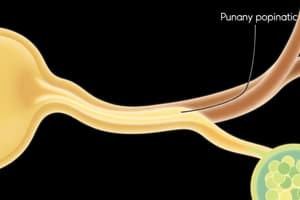Podcast
Questions and Answers
Which of the following are steps of urine formation? (Select all that apply)
Which of the following are steps of urine formation? (Select all that apply)
- Glomerular Filtration (correct)
- Tubular Reabsorption (correct)
- Renal Clearance
- Tubular Secretion (correct)
What is glomerular filtration?
What is glomerular filtration?
Blood pressure filters all small substances out of the blood (glomerulus) and into Bowman's capsule.
What does the filtrate contain?
What does the filtrate contain?
- Proteins, Lipids, Hormones
- Water, Amino Acids, Glucose, Ions, Wastes (correct)
- Sodium, Potassium, Calcium
- Only Water
What is the glomerular filtration rate (GFR)?
What is the glomerular filtration rate (GFR)?
Where does tubular reabsorption primarily occur?
Where does tubular reabsorption primarily occur?
Which substances are typically reabsorbed during tubular reabsorption? (Select all that apply)
Which substances are typically reabsorbed during tubular reabsorption? (Select all that apply)
What is one important substance that is reabsorbed?
What is one important substance that is reabsorbed?
The hormones that affect water reabsorption in the kidneys are _____ and _____
The hormones that affect water reabsorption in the kidneys are _____ and _____
What is the role of aldosterone in kidney function?
What is the role of aldosterone in kidney function?
What does antidiuretic hormone (ADH) do?
What does antidiuretic hormone (ADH) do?
What occurs during tubular secretion?
What occurs during tubular secretion?
Which ions are typically added to the urine in tubular secretion? (Select all that apply)
Which ions are typically added to the urine in tubular secretion? (Select all that apply)
How does the secretion of H+ affect blood pH?
How does the secretion of H+ affect blood pH?
Flashcards are hidden until you start studying
Study Notes
Steps of Urine Formation
- Urine formation occurs in three main stages: glomerular filtration, tubular reabsorption, and tubular secretion.
Glomerular Filtration
- Blood pressure drives the filtration of small substances from the blood in the glomerulus into Bowman's capsule.
- This process generates a filtrate containing various solutes and waste products.
Composition of Filtrate
- Filtrate includes essential components:
- Water
- Amino acids
- Glucose
- Ions
- Wastes
Glomerular Filtration Rate (GFR)
- GFR is the volume of filtrate produced each minute, indicating kidney function.
Tubular Reabsorption
- During tubular reabsorption, useful substances filtered out are returned to the bloodstream.
- This process primarily occurs in the proximal convoluted tubule.
Substances Reabsorbed
- Key substances reabsorbed during this phase include:
- Ions (e.g., sodium)
- Glucose
- Amino acids
- Some water
Important Reabsorbed Substance
- Water is critically reabsorbed via osmosis, regulating body hydration.
Hormones Influencing Reabsorption
- Two primary hormones regulate water reabsorption in the kidneys:
- Aldosterone: Promotes Na+ reabsorption, consequently increasing water reabsorption.
- Antidiuretic Hormone (ADH): Directly increases water reabsorption.
Aldosterone Function
- Aldosterone enhances the reabsorption of sodium ions (Na+), leading to increased water retention.
Antidiuretic Hormone (ADH)
- ADH contributes to more efficient water reabsorption in the kidneys, crucial for maintaining body fluid balance.
Tubular Secretion
- Tubular secretion is the process where excess ions and waste products are added to urine from the blood.
Ions Secreted into Urine
- Ions commonly secreted include:
- Hydrogen ions (H+)
- Potassium ions (K+)
- Ammonium ions (NH4+)
Role of H+ Secretion
- The secretion of H+ ions is vital for regulating blood pH:
- Increased H+ secretion occurs when blood pH is too low (acidic).
- Reduced H+ secretion occurs when blood pH is too high (basic).
Studying That Suits You
Use AI to generate personalized quizzes and flashcards to suit your learning preferences.




